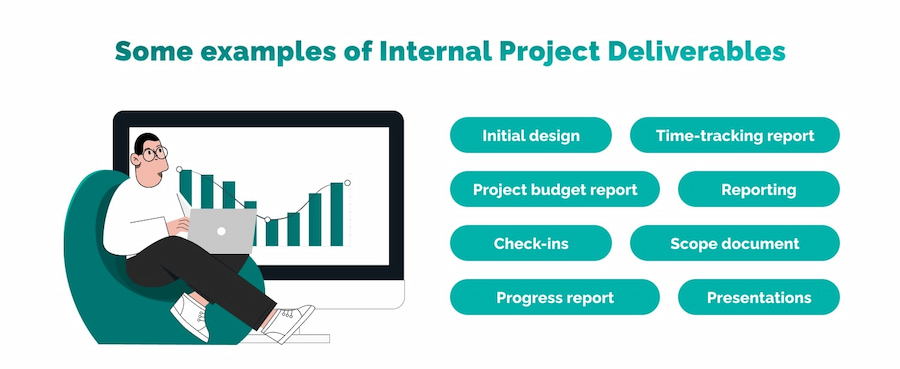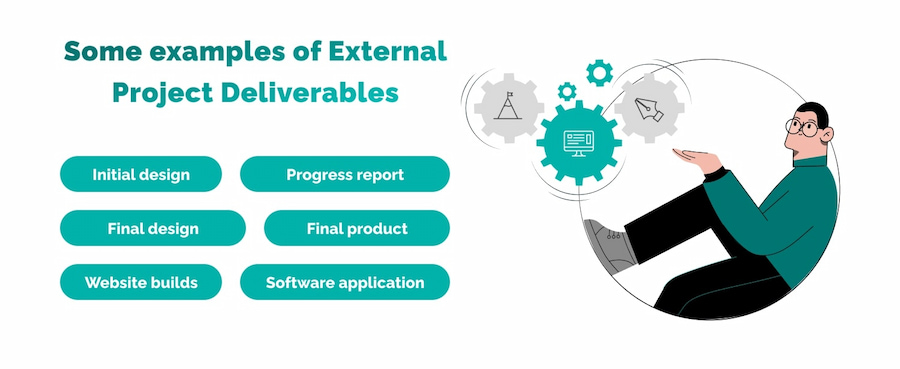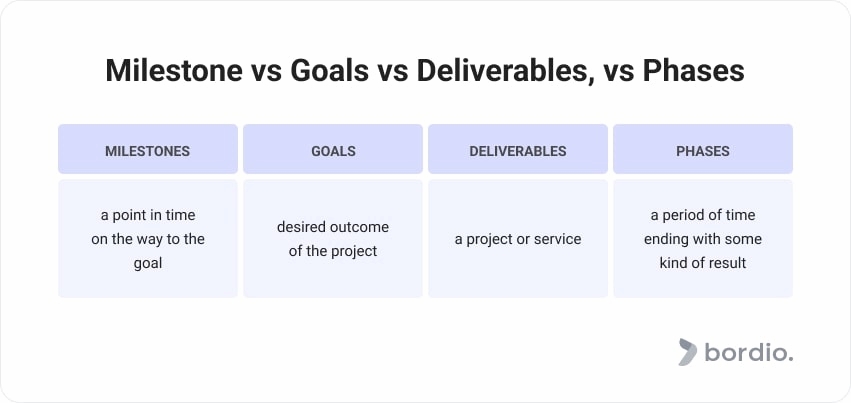A deliverable in project management is any tangible or intangible outcome produced from project work. These deliverables are critical components that signify progress and success at various project stages. Understanding a project deliverable is essential for efficient project management, as it helps define goals, allocate resources, and keep teams aligned throughout the project management process. In this article, we’ll explore what is a deliverable, the different types of deliverables in project management, and how they fit into the broader scope of successful project management. Understanding deliverables is essential for keeping teams aligned, meeting project goals, and satisfying stakeholder expectations.
What is a Deliverable in Project Management?
In project management, a deliverable refers to any tangible or intangible output that is produced as part of a project. These deliverables are essential components that indicate the completion of a particular task, phase, or the entire project.
Deliverables can take many forms, including reports, documents, software, services, prototypes, or any outcome that contributes to fulfilling the project’s objectives.
Deliverables are typically defined in the project’s planning phase and are used to track progress, ensure quality, and align the team’s efforts with stakeholder expectations. Successful project management relies on clearly identifying and managing deliverables throughout the project lifecycle.
Types of Deliverables in Project Management
In project management, deliverables can be classified into different types based on their nature and the project stage. Understanding the various types helps in defining expectations and tracking project progress more effectively. The main types of deliverables include:
- Internal deliverables: These are outputs produced within the organization for the team’s use, such as project plans, status reports, or design drafts. They are essential for internal communication and collaboration but are not typically shared with clients or external stakeholders.

- External deliverables: External deliverables are created for clients, customers, or other stakeholders outside the organization. Examples include final products, service agreements, or customer training materials. These deliverables directly impact the satisfaction and approval of the external parties involved.

- Tangible deliverables: These are physical or measurable outputs, such as a product, prototype, or a piece of software. Tangible deliverables are concrete and can be assessed for quality and completion.
- Intangible deliverables: Intangible deliverables involve non-physical outputs like intellectual property, ideas, or knowledge transfer. Examples include business strategies, patents, or project documentation.

By categorizing deliverables, project managers can ensure that each type is tracked and completed according to its role within the project.
Examples of Deliverables
Deliverables vary widely depending on the industry and project type, but some common examples include:
- Product prototypes: In product development projects, a prototype or sample of the final product is a key deliverable used to test and refine the concept before full production.
- Project plans: A detailed project plan, including project timelines, budgets, and resource allocation, is often delivered at the start of a project to guide all team members.
- Software updates: For tech projects, deliverables often include completed versions or updates of software that meet specific feature or functionality requirements.
- Marketing campaigns: In marketing projects, deliverables can range from full campaign strategies to specific assets like social media posts, advertisements, or promotional videos.
- Research reports: In research-based projects, the final report outlining findings, analyses, and recommendations serves as the primary deliverable.
- Training materials: Deliverables can also include training guides or instructional content developed to help users or employees understand new processes, systems, or products.
Deliverables vs. milestones
It’s important to differentiate between deliverables and milestones in project management. A deliverable is a tangible or intangible output that must be completed and provided to stakeholders, often contributing directly to the project’s end goal. In contrast, a milestone is a significant event or checkpoint in the project timeline. While a project milestone marks progress, a deliverable is a completed product or part of a project that you can hand over.

For example, if a new software is being developed, the milestone might be completing the design phase, whereas the deliverable is the fully developed software or its initial version. Milestones help track progress, but deliverables are the concrete results produced during the project.
When to Finalize Deliverables in a Project
Agreeing on deliverables is a crucial step in project management that should be addressed early in the project lifecycle. Here are key points to consider:
- During project planning: It’s essential to define deliverables during the planning phase. This ensures that all stakeholders have a clear understanding of what will be produced, its quality standards, and delivery timelines. An early agreement helps avoid misunderstandings later on.
- Before work begins: Ensure all project deliverables are agreed upon and documented before any work starts. This gives the team a clear direction, aligns expectations, and sets the groundwork for tracking progress against these deliverables.
- At the start of each project phase: For larger projects with multiple phases, it’s a good idea to confirm deliverables at the start of each phase. This helps ensure the scope and expectations remain consistent as the project evolves.
- After changes or updates: If there are any significant changes to the project scope or objectives, deliverables should be reviewed and re-agreed upon. Adjusting deliverables mid-project without stakeholder consensus can lead to scope creep, missed deadlines, and dissatisfaction.
- With sign-off from stakeholders: Always get formal approval from key stakeholders on deliverables. Whether it’s a signed agreement or documented approval, having a clear record ensures that everyone is on the same page and expectations are locked in.
Properly timing these agreements ensures the project team knows exactly what is expected, reducing the risk of confusion or rework later.
FAQ: What Is a Deliverable
❓ What are deliverables in project management?
Deliverables in project management are the tangible or intangible outputs produced during the course of a project. These can include reports, products, software, or any item that must be delivered to complete a project.
❓ How are project deliverables defined?
Project deliverables are defined based on the project’s goals and stakeholder expectations. They outline the specific outcomes that will be produced during the project, helping guide the project’s workflow and ensure alignment with objectives.
❓ What is a deliverable in a project tracked?
Deliverables are tracked throughout the project lifecycle using tools like Gantt charts, timelines, and project management software to ensure deadlines are met.
❓ How do project management deliverables impact timelines?
Project management deliverables directly affect timelines as they set specific goals that need to be completed by certain dates. Clear deliverables help ensure that the project stays on track and meets deadlines efficiently.
❓ What are examples of project deliverables?
Examples of project deliverables can include a completed website, a detailed financial report, a marketing campaign, or even the design of a new product. Each deliverable is tied to a project milestone and helps measure progress.
❓ Who oversees deliverables in a project?
Deliverables are typically overseen by the project manager, who is responsible for ensuring that each deliverable meets the project’s requirements and is completed on time. The project manager coordinates with team members, stakeholders, and any other relevant parties to manage and review deliverables.
❓ Can you change deliverables during the project?
Yes, deliverables can be changed during the project, but any changes should be carefully managed through a formal change control process. Changes to deliverables might be necessary due to evolving project requirements or unexpected challenges. Proper documentation and approval processes are essential to ensure that changes are communicated effectively and do not impact the project’s overall objectives.
Manage Your Deliverables Effectively with Everhour
Understanding and managing deliverables effectively is crucial for the success of any project. Deliverables represent the tangible or intangible outputs that a project must produce to achieve its goals. Clear definition, management, and oversight of deliverables help ensure that projects stay on track and meet their objectives.
For seamless tracking and management of deliverables, consider using Everhour. Everhour’s robust time tracking and project management features can help you monitor progress, manage tasks, and ensure that all deliverables are met on time. By integrating Everhour with your project management tools, you can keep a close eye on deliverables, improve team collaboration, and enhance overall project efficiency.
Explore how Everhour can support your project management needs and keep your deliverables on track.
If you are managing a team of 5 or more and looking to boost efficiency, Everhour is the perfect employee management software to keep your team on track. With seamless time tracking, you can easily estimate task durations, set clear budgets, and generate detailed reports inside Asana, Trello, Jira, or any other pm tool.

